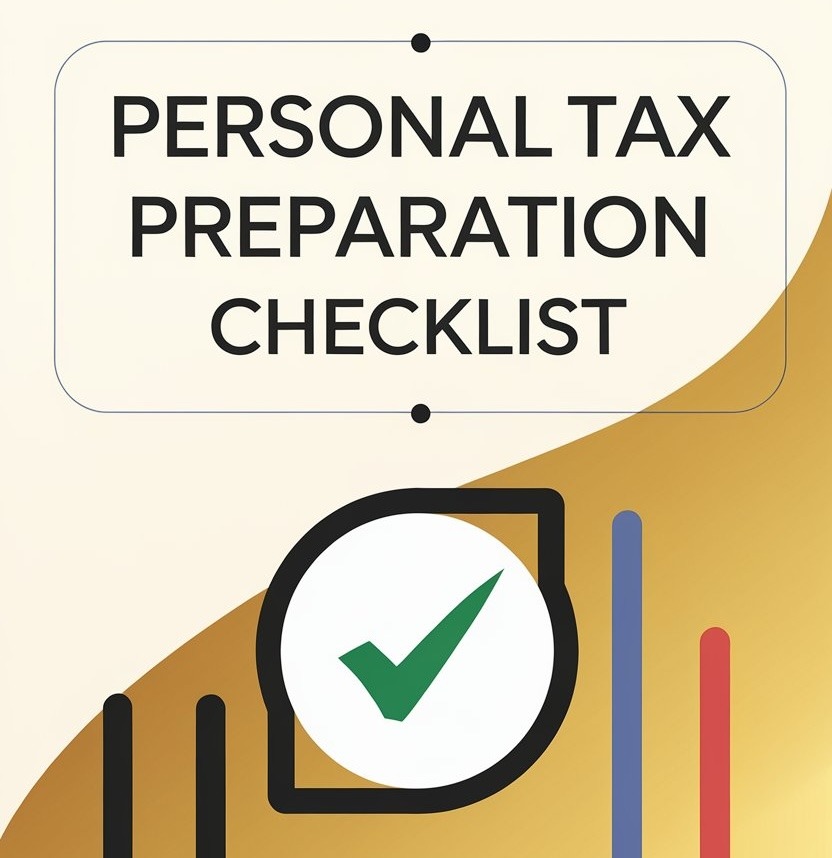It’s that time of year again! No, I’m not talking about the Yuletide season, I’m speaking on the adventurous time of the tax season.
Now is the best time to start gathering all of your data for the tax season.
Whether you know it or not, having a game plan or strategy for your taxes is the most important step in conquering this daunting task.
I’ve put together a list of easy ways to get you into the spirit of preparing for the 2025 tax season.
And don’t worry, it’s not too late to get started!
THIS POST MAY CONTAIN AFFILIATE LINKS. PLEASE READ MY DISCLOSURE FOR MORE INFO. Which means if you click on any of the links, I’ll receive a small commission at no additional cost to you.
1. Gather Tax Checklist Documents
As your financial statements begin to roll in, place them in a dedicated folder or binder and mark it “2025 tax information.”

In this folder you can also place your W2s, mortgage interest document, giving contribution statement, and any other tax related documents.
This will not only make it easy for you, it will also make it a smooth process when your taxes are being prepared by a qualified Tax Advisor.
Click HERE for the complete tax preparation check list needed for filing your taxes.
Another important tip to keep in mind when gathering data for the tax season, is to know where everyone’s important cards and certificates are located for your family.
Important tax checklist identification items such as:
- social security cards
- driver’s license
- passports
These are needed to help save both you and the Tax Preparer much time when filing taxes.
Remember: Keep track of your expenses and income on a spreadsheet or bookkeeping program such as FreshBooks.
2. Organize Your Tax Preparation Documents
Organization is key to surviving the tax season.
It’s not too late to start going through your receipts and bank statements from the previous year. This is the primary key to making tax prep easier and faster.

You can choose to do it all at once in one day or for others who hate anything tax related, try going through two months of financial documents a day in order to ease the burden.
3. Know Your Tax Filing Status
According to the IRS, filing status impacts the calculation of income tax, affects the amount of the standard deduction, and determines allowance or limitation of certain credits and deductions.

The following list puts the filing statuses in order from the most beneficial to the least beneficial to the taxpayer.
What was Your Tax Filing Status be at the end of 2024?
- Married Filing Jointly
- Qualifying Widow(er) with Dependent Child
- Head of Household
- Single
- Married Filing Separately
What Filing Status Should I Use?
It is very important to select the correct filing status when filing your individual tax return.
PRO TIP: Many tax credits, deductions, and the amount of taxes paid are dependent upon the filing status selected.
The 5 Filing Statuses:
At times, more than one filing status may apply to you. In this case you should work with your Tax Advisor to figure out which status is best for you.
Single
You must file single if you are considered unmarried and do not qualify for any other filing status.
Married Filing Jointly
You can file as married filing jointly if you are considered married and your spouse agrees to file a joint return.
Married Filing Separately
You can file as married filing separately if you desire or if you cannot agree to file a joint return with your spouse.
Head of Household
You can file as head of household if you meet all of the following requirements:
- Unmarried or considered unmarried on the last day of the year
- Paid more than half of the cost of keeping up a home for the year
- A qualifying person lived in your home for more than half of the year except for temporary absences such as illness, education, business, vacation, or military service. If the qualifying person is the dependent parent, the qualifying person does not have to live with you.
Qualifying Widow(er) with dependent child
A widow or widower with one or more dependent children may be able to use the qualifying widow with dependent child filing status.
More Tax Savings: File at Ease at Home with Turbo Tax
4. List All Possible Tax Deduction
A tax deduction works by totaling your deductions and subtracting them from your adjusted gross income or AGI. This reduces your tax bill for the year.

A tax deduction is commonly a result of expenses, particularly those expenses that were incurred to produce additional income.
There are two types of tax deductions: Standard Deduction and Itemized Deduction.
The IRS lets you decide whether you want to claim the standard deduction or itemize your deductions.
Most people choose the standard deduction because it’s easier and may provide a greater deduction.
Standard Tax Deduction
The standard deduction is a fixed amount set by the IRS that reduces your adjusted gross income; however, it is based on your filing status, which is determined by your marital status as of the end of the year.
For tax year 2025, the standard deduction amounts are as follows:
| 2025 Standard Deduction and Personal Exemption (Estimate) | |
| Filing Status | Deduction Amount |
| Single | $15,000.00 |
| Married Filing Jointly | $30,000.00 |
| Head of Household | $22,500.00 |
| Married Filing Separately | $15,000.00 |
| Personal Exemption | Eliminated |
Itemized Tax Deduction
Individual deductions that are kept track of throughout the year.
If your total itemized deductions exceed the amount of your standard deduction, then you’d probably want to go with the itemized deduction option.
You’ll receive a bigger tax break with this option; however, it may be more work on the back end.
PRO TIP: Most people like itemized tax deductions because they involve expenses you have to take on anyway, like your mortgage and property taxes.
Common Types of Itemized Deductions:
- Mortgage Interest
- Property Taxes
- Charitable Donations (donating to Goodwill, tithing at church, giving money to non-profit organization, etc.)
- Medical Expenses
Get your FREE Tax Refund Estimator TODAY!
5. Search for Tax Preparer or Accountant Early
When searching for a qualified Tax Preparer, be sure to know what his or her mission statement is and what type of service they offer.

Always check the availability and accessibility of the preparer (year-round vs seasonal availability) just in case you need to contact them for an emergency.
Referral from a trusted friend or family member is a good way to figure out if the Tax Preparer is ethical and honest.
Be wary of boosted promises that cannot be backed up by the current IRS policies. For example, if you see tax signs around your city that guarantees an enormous refund check, then RUN FAR AWAY!
A good tax advisor will be upfront about their service, cost, and the reality of your situation.
Your tax refund or tax payment will be the SAME no matter who you go to…
…as long as every applicable tax deduction, tax credit, and accurate financial information is given.
If you want more handy tax tips, then feel free to check out my latest articles here. You can sign up to get on the waiting list if you’d like to file with me this year.
6. Beware of Tax Identity Theft
Tax fraud from possible identity theft is becoming a growing issue in the tax world.

Many people are unaware that each year countless tax returns are rejected because someone has stolen their identity and filed a false tax return using their information.
Sometimes this fraud is due to identity theft, while other times it is due to tax payers who may take their W2s to a tax office for a free consultation not knowing the preparer will file their refund without their consent.
For this reason, it is important to TRUST your tax preparer and limit who has access to your valuable financial information.
More Tax Tips: Read ways you can prevent fraudulent tax activity.
7. Remember that Earned Income Tax Credit (EITC) Refunds Will be Delayed
This new law requires the IRS to hold the entire refund (even the amount not associated with the EITC or ACTC).
2025 Earned Income Tax Credit Table
| Filing Status | No Children | One Child | Two Children | Three or More Children |
|---|---|---|---|---|
| Income at Max Credit | $19,104 | $50,434 | $57,310 | $61,555 |
| Maximum Credit | $649 | $4,328 | $7,152 | $8,046 |
| Phaseout Begins | $10,620 | $23,350 | $23,350 | $23,350 |
| Phaseout Ends (Credit Equals Zero) | $26,214 | $57,554 | $64,430 | $68,675 |
Meaning that refunds likely won’t arrive in bank accounts or debit cards until the week of February 27, 2025.
You can use the Use the Where’s My Refund? link to check out your daily status.
8. Keep the IRS Refund Cycle Chart in Mind
Once you file your taxes, you can use the IRS Refund Cycle Chart as a way to estimate when you will receive your taxes.
The IRS e-file Refund Cycle Chart applies to direct deposit and check dates.
2025 IRS Refund Chart
Based on historical IRS processing timelines and assuming the IRS begins accepting tax returns on January 27, 2025, here is an estimated refund cycle chart:
| Date Accepted | Direct Deposit Sent | Paper Check Mailed |
|---|---|---|
| Jan 27 – Feb 1, 2025 | Feb 17, 2025 | Feb 21, 2025 |
| Feb 2 – Feb 8, 2025 | Feb 24, 2025 | Feb 28, 2025 |
| Feb 9 – Feb 15, 2025 | Mar 3, 2025 | Mar 7, 2025 |
| Feb 16 – Feb 22, 2025 | Mar 10, 2025 | Mar 14, 2025 |
| Feb 23 – Mar 1, 2025 | Mar 17, 2025 | Mar 21, 2025 |
| Mar 2 – Mar 8, 2025 | Mar 24, 2025 | Mar 28, 2025 |
| Mar 9 – Mar 15, 2025 | Mar 31, 2025 | Apr 4, 2025 |
| Mar 16 – Mar 22, 2025 | Apr 7, 2025 | Apr 11, 2025 |
| Mar 23 – Mar 29, 2025 | Apr 14, 2025 | Apr 18, 2025 |
| Mar 30 – Apr 5, 2025 | Apr 21, 2025 | Apr 25, 2025 |
| Apr 6 – Apr 12, 2025 | Apr 28, 2025 | May 2, 2025 |
| Apr 13 – Apr 19, 2025 | May 5, 2025 | May 9, 2025 |
| Apr 20 – Apr 26, 2025 | May 12, 2025 | May 16, 2025 |
| Apr 27 – May 3, 2025 | May 19, 2025 | May 23, 2025 |
Note: These dates are estimates and can vary based on IRS processing times and individual circumstances.
Just keep in mind that these dates are estimated and have not been and will not be published by the IRS.
When does IRS start accepting taxes in 2025?
Although the date varies each year, you can expect to have your tax return accepted by the IRS as early as January 27, 2025.
The IRS refunds are usually issued within 21 days of the return being accepted. It may take up to 2 business days for the bank to post the direct deposit.
More Tax Tips: You can view the Refund Cycle Chart here to see when you should receive your refund check.
9. Know the Last Day of Tax Season
Tax Day is April 15 each year, but can vary if the day falls on a weekend or national holiday. The deadline for most tax payers to file their 2024 tax return is April 15, 2025.
10. Understand the New Tax Laws
The changes to the new tax law may have you left with many unanswered questions.

I want to make sure that you’re able to understand the key points to the new changes in the latest tax reform.
- We still have seven tax brackets for individuals, but the tax rates have changed.
- The standard deduction has almost been doubled.
- No more personal or dependent exemptions (for now).
- The moving expense deduction has been eliminated.
These are just a few additions to the new tax reform law. You can read my full guide here.
11. Use Your Refund to Get One Step Ahead
This is your time to save your hard-earned money or to pay off that debt that’s been hanging over your head.

I know you want to TREAT YO SELF, but use this refund as an extra bonus for your path to financial freedom!
Save Money (even on a tight budget) with This ULTIMATE SAVINGS GUIDE!
12. Protect Yourself from Gift Card Scams
You should be vigilant about gift card scams, where fraudsters impersonate IRS officials to demand tax payments via gift cards.
Remember, the IRS never requests tax payments through gift cards. If you receive such a request, it’s a scam.
Protect your financial information and report any suspicious activity to the IRS immediately.
13. Accessing Your Retirement Funds in a Disaster
In the wake of a federally declared disaster, the SECURE 2.0 Act allows qualified individuals to access their retirement savings more easily.
This provision can provide much-needed financial relief during challenging times. It’s important to understand the eligibility criteria and potential tax implications before withdrawing funds.
Get your biggest tax refund guaranteed with TurboTax. The #1 best selling tax software. Start today.
My Final Thoughts
I hope these tax tips help you prepare the right way for the Tax Season!
For your convenience, I’ve compiled a tax preparation checklist for you to save that you can download, fill out on your computer or mobile device, and save.

What’s your favorite tip for tax season? Let us know in the comments section below.
If you enjoyed this article, then you’ll love these:
- Best Rules for Claiming a Dependent on Your Tax Return
- When and How to Claim Tips on Your Tax Return
- Do I Need to File a Tax Return?
- How to Choose the Best Filing Status
- Top 12 Things You Must Know About the New Tax Law
- Divorce and Taxes: Everything You Need to Know
Get started on your taxes early TODAY!
Until the next money adventure, take care!

Disclaimer Statement: All data and information provided on this site is for informational purposes only. The Handy Tax Guy makes no absolute representation of the correctness, mistakes, omissions, delays, appropriateness, or legitimacy of any information on this site. **Note: Each client circumstance will vary on a case-by-case basis**
(Original Article Date: March 7, 2019/Updated On January 21, 2025)





I really don’t want to have to deal with my taxes next year. Thanks for explaining that I will want to consider looking into hiring an expert to help me with my taxes. That will help me get it all done faster as well.
Hi Emily!
It was my pleasure to help you. If you have any questions, please don’t hesitate to reach out to me.
Handy